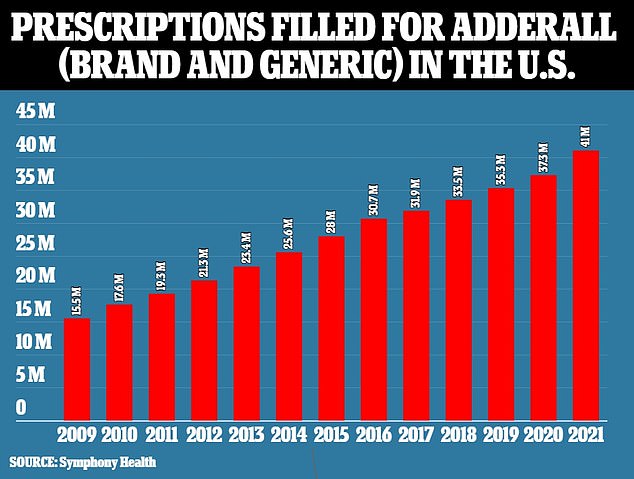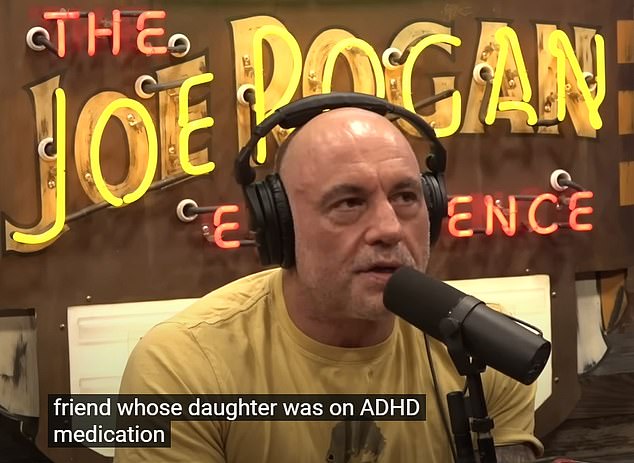Joe Rogan once again expresses his doubts about ADHD and the use of drugs to treat the disease.
While interviewing Fox News host Kat Timpf, who has been taking ADHD medication for three decades, Rogan said he wasn’t sure what ADHD was or whether it should be considered a disease.
The host has repeatedly raised questions about the disease on his popular podcast, The Joe Rogan Experience, which has more than 14 million followers.
She said, “I don’t know what this is. Because every time someone talks about ADHD and people want to insist that it’s a real pathology, that it’s a real problem, I always say, wow, I don’t know, because I think it’s a superpower.”
Ms Tampf, 35, said she was diagnosed with ADHD at age five and was prescribed amphetamines shortly afterwards, but only stopped because she is now pregnant and worried about how the drugs could affect her unborn child.
Joe Rogan suggested during the episode that it was not necessary to take medication if you were diagnosed with ADHD.
During the episode, viewed more than 650,000 times on YouTube, Rogan told Timpf she seemed like “a wonderful person” without the drugs, before adding: “I don’t think you need them.”
Later in the podcast, the host warned Timpf that there is no such thing as a “biological free lunch,” positing that ADHD medications could trigger complications later in life.
Ms. Timpf said: ‘I feel like I’m getting to know myself, but at the same time I’m not really myself because of the pregnancy.
“I’m curious to stop taking it a little bit more after pregnancy, just to see if it works. I’m going to go back on it to some extent.”
She said she was started on drugs at a young age after she became disruptive in class, and said when she had previously come off drugs she felt like she was “walking through mud.”
ADHD, or attention-deficit hyperactivity disorder, is defined as a behavioral disorder in which patients are persistently inattentive, hyperactive, or impulsive.
Since the 1980s, powerful amphetamines like Adderall have been used to treat it, which work by causing an increase in neurotransmitters in the brain to improve attention and concentration.
ADHD diagnoses have been on the rise in the United States, with an estimated 7 million youth ages 3 to 17 now living with the condition — about a million more than before the COVID-19 pandemic. In total, an estimated 8.7 million Americans have ADHD.
Adderall prescriptions have increased 16 percent since the Covid pandemic: 41 million were prescribed in 2021, the latest date available, compared with 35.3 million in 2019.
The United States is an outlier in ADHD treatment compared to European countries: 11 percent of American children under 17 are diagnosed with the condition, compared with one percent of their French and British counterparts.
Globally, the United States accounts for up to 69 percent of the ADHD industry, which is estimated to be worth $9.6 billion.
Once prescribed the drug, patients are asked to take amphetamines two or three times a day, often for the rest of their lives.
This is despite concerns about the side effects of taking the drugs for extended periods of time, with the American Addiction Centers previously saying, “Although Adderall use can help a person achieve impressive mental or physical gains, long-term use or short-term use at high doses can result in impaired cognition or physicality due to its many side effects.”
Studies warn that long-term use of amphetamines like Adderall can lead to mood problems such as anxiety, depression, or even psychosis.
The comments are just the latest attack on ADHD from Mr Rogan, who two years ago invited Canadian physician Dr Gabor Mate onto his podcast, who declared that ADHD was “not a disease nor hereditary”.
Dr. Mate told Mr. Rogan two years ago: ‘A lot of the so-called experts say that (ADHD) is the most hereditary disease there is, and I say it’s not a disease and it’s not hereditary.
‘Poor impulse control and sometimes hyperactivity (difficulty sitting still and a tendency to fidget) are not diseases or hereditary.’
He suggested that normally when someone is stressed, their fight-or-flight response is activated, but in cases where someone is unable to do so, the brain may simply shut down and not focus, in what has been termed ADHD.
Rogan also challenged journalist Timothy Denevi about ADHD while writing an article for Salon.
Mr Denevi, who has written an entire book about the disease, revealed that Rogan asked him: “I mean, don’t you have any problems that you need to take it for?”

Adderall prescriptions have been steadily increasing over the past 12 years. Figures include prescriptions for both brand-name and generic Adderall in the U.S.
Mr Rogan’s views are likely to reflect the controversy over the condition in academic circles, with several experts insisting that ADHD is not a condition that should be treated with medication.
Rather, they argue that it is a difference in mental state and that this causes someone to function less well in a standard learning or work environment.
Patients have also previously described that stopping medication makes them feel like they are “walking through mud” or find it very difficult to concentrate.
Speaking on his podcast, Rogan said: ‘I think everyone would like to be a bit more productive, especially if you’re a creative type, a writer.
“But there is no such thing as a biological free lunch, and there is likely some long-term damage from a lifetime of stimulation of your system.”
He added: “I know a lot of people who did a lot of cocaine in the 70s and they are all pretty screwed up. A lot of them died from neurological problems.”
“I wonder what the difference is between taking cocaine five nights a week for a few hours and taking a pill every day that makes you nervous. Who knows, you might get angry during that time.”
Cocaine is illegal in the United States for most purposes and is classified as a Schedule II substance, on par with fentanyl, morphine and opium.
The FDA also considers amphetamines to be Schedule II substances, meaning they have a high potential for abuse but can be obtained by prescription for ADHD.
Amphetamines work by stimulating the release of the neurotransmitters dopamine and norepinephrine, improving concentration, attention and energy levels, and also increasing mood and feelings of euphoria.
In recent years, some students have turned to amphetamines (such as Adderall) as study drugs, to memorize information before a test or to write an essay quickly.

